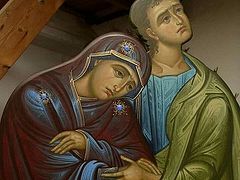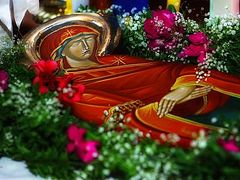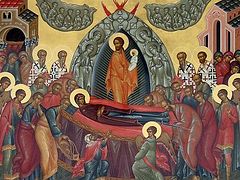There are many things that people fear. And there are many things that cause them pain. But there is nothing compared to death. A person feels pain and fear not only when he contemplates the finite nature of his own life or encounters death face to face. He can’t be indifferent to the departure of his close ones; he suffers when the time comes to part with those he loves, who are truly dear to him.
I have met very few people who have clearly conquered the fear of death. Once one of them, a national war hero, who had performed military exploits so easily and ordinarily that they seemed to be something natural to him, was asked whether he is afraid of death. He answered, “For this, one simply has to overcome the instinct of self-preservation.” But even these people, including him, could not but view death as a tragedy, not sense its horror, its unnatural nature.
And it would be strange if someone where to view it any other way—after all, we were not created for death but for life—eternal and blessed. Death was the consequence of the fall into sin, its result. It is not something natural, something that goes without saying for us. It is in fact a tragedy.
And people try to come to terms with this tragedy however they can. Some are paralyzed at the fear of death, others to the contrary try to banish the thought that sooner or later their earthly path will end, while others hope that incarnation is real and that they will continue their earthly existence in some other form.
But the Christian… the Christian believes that life does not end with death, that after death we pass into another world that is unknown to us but nevertheless more beautiful—that is of course if we are found worthy of it. He believes… Or to be exact he should believe. And if he doesn’t believe, then probably he is not a Christian after all. For one’s relationship to death is a sort of litmus test—if all our thoughts are only attached to the earth and all our hopes are bound up with the earthly, if our thoughts and hopes do not extend beyond the borders of the temporal, if we do not yearn for the future age, then our faith is only formal, like the Gospel house built upon sand that falls during times of trial—And the rain descended, and the floods came, and the winds blew, and beat upon that house; and it fell: and great was the fall of it (Mt. 7:27).
Death is a moment of trial—our final trial and therefore the most important. It reveals everything that a man has inside himself, whatever he has gathered and stored up during the time of his earthly sojourn. It separates the truth from the lie, the false from the real, the superfluous from the essential. Moreover death knows everything about a person and can tell him and others near him about himself, just who he is. I recall an image from somewhere in childhood: A man in a smock with small a metal rod in his hand lightly strikes a crystal vase and listens. If the sound is broken and short then the vase has a defect, but if there is a pure and long sound, then there are no defects and the vessel is suitable for use. Well, death is like the man in the smock with the rod, and we are the vessels undergoing the test. And it is all the more terrible because it is our last test—we cannot change anything after this. That is why we call all to prepare for it, like no student, even the most zealous, has ever prepared for an exam.
Schema-Archimandrite Sophrony (Sakharov) says that for many Athonite fathers it was a custom not to express your judgment about a brother until the time comes, but to say, “Let’s wait. Let’s see how he’ll be at death…” And death always answered their question as to what that monk’s podvig was, whether he pleased God or was mistaken, or even hypocritical, whether that brother walked in the truth or was spiritually deluded.
Death knows everything about us, but we should know no less than that about ourselves and about death. And we should look inside ourselves and watch what everyday life, and not death, reveals in us. We should watch how we respond to those intervening trials and examinations that fill each new day and every hour—sometimes even every minute. We should take account as we go along about how our hearts react to the thought of death, what takes place in them—fear, despair, hope, or joy?
Definitely, in order to learn how to relate correctly to death we have to try to understand, to clarify for ourselves how the saints departed to eternity. This is soul-saving, it is edifying, and it is truly necessary.
But probably in order to do this there is nothing more important for us than the Dormition of the Most Holy Mother of God—that resettling, that passing from the earthly to the heavenly, which the tongue fails to call death. Here is a glimpse of a wondrous mystery: What is death really, and what do we, albeit mistakenly, call it?
It is after all a stumbling stone for many, an unresolved puzzle, put off in our consciousness for another day. How do we read and talk about Christ trampling down death by death? There it is, day after day we see it in one way or another, run up against it, and people die just as they did before the Savior came into the world. How do we reconcile these two things?
But in fact what we call death is not death; it in truth is something resembling sleep. We fall asleep here, and wake up again in a new, unearthly place. And real death… Real death is infinitely terrifying; it is separation from God, the impossibility of being with the One who is the Source of life and at the same time Life Itself. This is the death that the Son of God came to deliver us from; and He did deliver us, and every human being received this amazing and at the same time terrible choice: to live or to die. Moreover it happens not at some precise moment (if we don’t mean torments!), but takes place throughout a person’s life and becomes its crown.
The life of the Most Holy Mother of God was in this sense real in the highest degree—the breath of death was not even felt in her. After all, the smell of death is sin… Once St. Silhouan of Mt. Athos heard a passage from the book of the prophet Isaiah being read in church, with the words, Wash ye, and make ye clean (Is. 1:16), he thought, “Perhaps the Mother of God sinned some time even if only in thought?” And immediately in his heart a voice said clearly along with the prayer, “The Mother of God never sinned, even in thought.” “Thus,” he wrote, “The Holy Spirit witnesses to her purity in my heart.”
But so that no one might think that the Most Pure One was not like other people, that there was nothing in her that the imperfect do not have, he adds, “During her earthly life she had certain incompletenesses and sinless mistakes of imperfection. This is clear from the Gospel reading about when she returned from Jerusalem not knowing where her Son was, and then searched with Joseph for him for three days (see Lk. 2:44–46).”
There was no sin in the Theotokos’s life that was in opposition to God, nothing that would separate or alienate her from Him. Behold the Handmaiden of the Lord… (Lk. 1:38). In her answer [to the archangel Gabriel] is the entire essence of her life as total dedication to God’s will—such dedication, such complete and total consent that no one before her had ever had, nor ever will have on earth.
And that is why there was not nor could have been any fear of death on her part. She knew where and to Whom she was going by crossing the border between the lower world and the higher. Christ her beloved Son was her life on earth, and in an infinitely greater sense—in eternity. In part, the words of the Apostle Paul in some small measure explain to us the mystery of what was hidden in the soul of the Mother of God: For to me to live is Christ, and to die is gain (Philip 1:21) and what follows afterward, For I am in a strait betwixt two, having a desire to depart, and to be with Christ; which is far better (Philip 1:23).
Therefore in the life of the Most Pure Virgin Mary and in her Dormition we have the answer to the question of how to conquer not only the fear of death, but even death itself. To live so that there be nothing more important for us than to live with Christ. So that nothing that might distance or separate us from Him might come near us or cleave to our hearts, so that our hearts might seek the freedom from sin that only He can give. So that love for Him—not in words or in thoughts, but expressed and cultivated in deed—might allow us to understand that if it is good for us to be with Him here, then how good it must be with Him there…
Death can then be transformed for us from a tragedy, horror, or pain into a dormition, a gentle and peaceful sleep, and will be resolved by our awakening into joy, light, and a life in which death will be no more.





